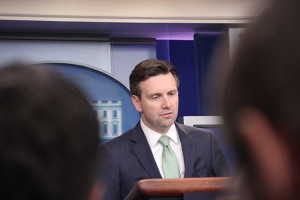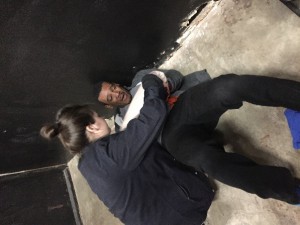
White House Press Secretary discusses national security after Islamic State attacks. (Sean Froelich/Medill).
WASHINGTON — White House Press Secretary Josh Earnest said Monday that no amount of U.S. military power will solve the chaos in Syria.
Earnest answered questions regarding President Barack Obama’s recent and upcoming meetings with world leaders to discuss how the Syrian civil war and threats posed by the Islamic State are being confronted.
Earnest assured reporters that international resources are being funneled together in order to meet the current U.S. plan of “degrading and defeating ISIL.”
“The success of this mission is dependent on 65 nations coming together, recognizing the common interest they have here and dedicating significant resources,” Earnest said.
Obama meets with French President Francois Hollande Tuesday as part of the international outreach.
Reporters asked Earnest about the ongoing efforts to snuff out terrorist threats in Belgium, which is currently on high alert against potential attacks following the massacre in Paris.
Earnest was mum on safety procedures in Belgium to ensure their secrecy, but suggested that security improvements Europe can make it easier for those allies to better defend their own national security.
Earnest said it is important to expand intelligence sharing within the European Union and with the U.S.
“That is certainly something we are committed to,” Earnest said. “And we are committed to helping our allies in Europe deal with this rather urgent threat.”
Congress voted last week to increase the security measures for Syrian refugees coming into the U.S. due to GOP fears that Islamic State operatives would sneak into the country.
“I think those who voted to further encumber the refugee process are accountable for their vote…it’s not likely to do much to improve the national security of the United States.”






